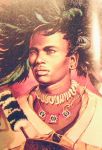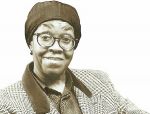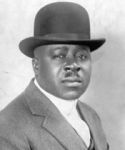Week of April 30-May 6
April 30
711 AD—Tarik the Moor invades Spain with force of 7,000 troops, routs the Visigoths and establishes Moor domination of Spain. While there remains some dispute over Tarik’s race, the weight of the evidence is strong that he was a Black man. He was described in accounts of the time as having “brown skin and wooly hair.” His full name was Tarik al Gibral. The famed Rock of Gibraltar is named in his honor.
 |
|
SHAKA
|
1828—Shaka, the great Zulu king and military leader, is killed. His innovative military strategies kept European imperialism at bay for years as he established Zulu dominance in large parts of Southern Africa. The Zulu nation grew to at least 250,000 with an army of over 40,000. But Shaka became increasingly dictatorial. Opposition to his dictatorship combined with jealousy led his two half brothers to assassinate him on this day in 1828.
May 1
1866—The two-day Memphis, Tenn., race riots, one of the most savage events immediately following the civil war, begins. When it was over former Confederate soldiers, angered by the loss of the Civil War and the new status for Blacks, had killed 46 Blacks and two of their White supporters as well as raped five Black women and torched over 90 homes, schools and churches. In support of the rebel soldiers, local police arrested hundreds of Blacks and not the Whites who were rioting. However, the savage nature of the rioting in Memphis (and a similar disturbance in New Orleans) prompted Congress to pass radical Reconstruction to aid Blacks, a civil rights bill, and the 14th Amendment to the Constitution guaranteeing citizenship and equal protection to former slaves.
 |
|
GWENDOLYN BROOKS
|
1950—Brilliant poet Gwendolyn Brooks, the first African-American to win a Pulitzer Prize, is born on this day in Topeka, Kan.
1967—The “Long Hot Summer” begins. The period between May 1 and Oct. 1, 1967 witnessed the most dramatic and destructive series of Black urban disturbances in American history. Major riots took place in 40 American cities. There were also lesser disturbances in 100 smaller towns and cities. Many felt the riots were sparked by a collective sense of frustrated hopes and a new urban generation less willing to adopt peaceful means for change.
May 2
1844—Master inventor Elijah McCoy is born in Colchester, Ontario, Canada. He would become the holder of over 50 patents—most were mechanical devices which greatly improved engines, locomotives and steamships. The superiority of his inventions led to the phrase “the real McCoy” coming to mean the mark of excellent and authenticity. McCoy was born to slaves who escaped America for a free life in Canada. His parents became successful and sent him to study engineering in Scotland when he was only 16. After the end of U.S. slavery, he settled in Ypsilanti, Mich., and began his remarkable career.
1870—One of the most unsung religious leaders in American history, William Seymour, was born on this day in Centerville, La. Seymour became pastor of the Azusa Street Mission in Los Angeles and the catalyst for the worldwide Pentecostal Movement. He not only rejected racial barriers in the church in favor of “Unity in Christ” but he is also credited with eliminating many of the restrictions placed on women in the church. He died of a heart attack in 1922.
May 3
1845—Macon B. Allen passes the Massachusetts bar becoming the first African-American lawyer to pass a state bar and the first Black person permitted to practice law in the United States. Allen was born in Indiana but after the Civil War he moved to South Carolina where he was elected a judge in 1873.
May 4
 |
|
ROBERT SENGSTACKE ABBOTT
|
1891—Dr. Daniel Hale Williams founds the Provident Hospital and Training Center in Chicago, Ill. It becomes a major training center for Black doctors and nurses. Williams is best known, however, for performing the nation’s first open heart surgery July 9, 1893. He operated on a man injured in a knife fight. The man would live for another 20 years after the surgery.
1961—Thirteen Freedom Riders began bus trips through the South to test Southern compliance with a 1960 U.S. Supreme Court ruling outlawing segregation in interstate transportation facilities. They were soon joined by hundreds of other “Freedom Riders” of all ages and races. Despite the court decision, dozens of Freedom Riders were arrested as the South attempted to hang onto its segregationist ways.
May 5
1905—Robert Sengstacke Abbott (1870-1940) founds the Chicago Defender newspaper, calling it “the world’s greatest weekly.” Indeed, he would build the Defender into the largest circulation and most influential Black newspaper of its day.
May 6
1787—Prince Hall organizes the nation’s first Black Masonic lodge in Boston, Mass.—African Lodge #459. Hall would go on to become the father of Black Masons in America and a major Black leader in the Northeast.
1812—Martin R. Delany, a pioneering Black nationalist, is born on this day in Charles Town, Va. Abraham Lincoln once described him as one of the most brilliant men he had ever met. Delany would fight in the Civil War to end slavery and become one of the nation’s first Black military officers. After the war he became a doctor. But over the years he became frustrated with American racism and began to advocate a return of Blacks to Africa.
(This Week in Black History is compiled by Robert Taylor. The next Black History Club meeting for DC area is May 1 at Martin Luther King Library (9th and G Streets, NW) from 12:30-1:30 p.m. in room 221. Call 202-657-8872 to register.)